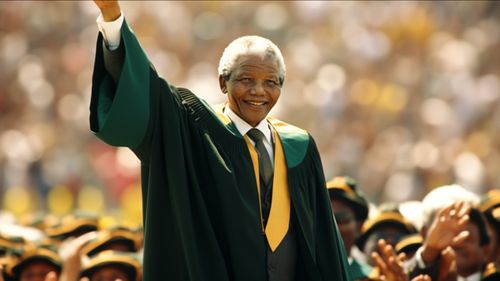The Significance of Nelson Mandela's Inauguration: A Symbol of Unity and Hope
Jan 24, 2024 · 2 mins read
0
Share

Nelson Mandela's inauguration on May 10, 1994, marked a historic moment, not just for South Africa, but for the world, symbolizing the triumph of democracy and equality over apartheid.
Save
Share
Held in Pretoria at the Union Buildings, the ceremony was a vibrant fusion of South African cultures, a stark contrast to the nation's segregated past.
Save
Share
Mandela's ascent to presidency was the culmination of a long struggle for freedom, making him the first black president in a country marred by centuries of racial division.
Save
Share
The event was attended by a diverse range of dignitaries globally, reflecting Mandela’s and South Africa’s newfound international stature.
Save
Share
Mandela's speech, imbued with themes of reconciliation and unity, set the tone for his presidency, emphasizing a future built on tolerance and mutual respect.
Save
Share
The inauguration was not just a political event; it was a cultural celebration, showcasing the rich diversity of South African music, dance, and traditional attire.
Save
Share
Mandela’s choice to wear a simple, dignified suit instead of elaborate traditional attire was a statement of his commitment to serving all South Africans equally.
Save
Share
The air force flypast and military salute, once symbols of apartheid oppression, were recontextualized as symbols of national unity and pride.
Save
Share
The ceremony’s peaceful nature and joyous atmosphere were themselves a testament to the significant strides made in healing a nation once divided by institutionalized racism.
Save
Share
Mandela's inauguration as depicted in his autobiography, "Long Walk to Freedom," stands as a beacon of hope and a testament to the power of perseverance and belief in the ideals of justice and equality.
Save
Share
0